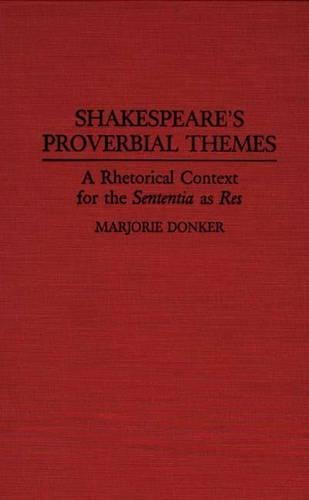
Shakespeare's Proverbial Themes: A Rhetorical Context for the Sentenia as Res
(Hardback)
Publishing Details
Shakespeare's Proverbial Themes: A Rhetorical Context for the Sentenia as Res
By (Author) Marjorie P. Donker
Bloomsbury Publishing PLC
Praeger Publishers Inc
15th September 1992
United States
Classifications
Tertiary Education
Non Fiction
Literary studies: c 1600 to c 1800
822.33
Physical Properties
Hardback
224
Width 156mm, Height 235mm
539g
Description
This study analyses the role of the sententia (proverb, maxim, adage) in the rhetorical process of invention and, particularly, Shakespeare's use of the proverb as a master theme. The plays have a characteristic structure in which the thematic statement is initiated in the early scenes and then repeated, with variations, throughout. In Hamlet, for instance, the sententia "all that lives must die, passing through nature to eternity" is exemplified and concretised in scene after scene. Donker demonstrates that Shakespeare was a product of his schooling in Tudor England in which simple proverbial material was considered to be the substance of moral philosophy, the "subject" to be developed, varied, and amplifed in school exercises. He was also following the dictate of Horace in "Ars Poetica", that moral philosophy was the proper subject of the poet, that the adage was to be the theme of fiction, to be modulated in a wide range of registers and tones throughout the work. Shakespeare was using the adage as central to the process of invention. Previous scholars have analysed the sententia as a hallmark of style in Shakespeare's plays, but not as the controlling theme. This is a well explicated argument that will be of interest and value to Shakespearean scholars and students of the history of rhetoric, with broader applications to the study of Graeco-Roman and Elizabethan cultures, the history and theory of drama, and humanistic studies.
Author Bio
MARJORIE DONKER is Professor of English at Western Washington University where her areas of specialization are comic and dramatic theory, Shakespeare, and English literature of the 16th and early 17th centuries. She is co-author of Dictionary of Literary-Rhetorical Conventions of the English Renaissance (Greenwood, 1982).
